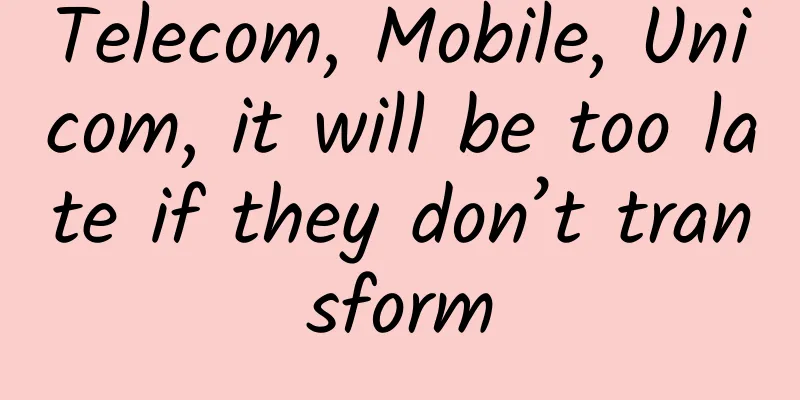Telecom, Mobile, Unicom, it will be too late if they don’t transform

|
Digital transformation has become a social consensus, and operators have also put forward their own goals, but progress has been slow. There are many reasons for this. Digitalization requires a lot of basic work to be done, and it is relatively easy to build a new digital enterprise, but it is quite difficult to transform old enterprises. For old state-owned enterprises like China Mobile, China Telecom, and China Unicom, which have hundreds of thousands of employees, transformation is even more difficult. On the contrary, companies like China Tower, which were established relatively late, can refer to the most advanced companies in many aspects and have a higher degree of digitalization. China Unicom has unified its internal systems due to the reorganization of China Unicom and China Netcom, which has already led the other two companies. No matter how difficult the transformation is, we must proceed and do it as quickly as possible because time waits for no one. It can be said that the epidemic has given operators the best time and opportunity to transform, which is a once-in-a-lifetime opportunity. During the epidemic, the pace of the whole society has slowed down, people's demand for the communications industry has increased, and operators have also had a rare relatively relaxed operating environment. If they don't transform now, when will they do it? What we can see is that the retail industry is rapidly transforming, and companies that do not transform are already being eliminated. Hema Fresh has entered a new climax in store openings, RT-Mart has gained a firm foothold in the retail industry against the trend, and Walmart Yonghui, which has been somewhat slow in transformation, has closed stores in many places. Facts have proved that pseudo-digitalization is not feasible and must be carried out in a down-to-earth manner. If operators cannot complete digital transformation within two to three years, Internet companies will obviously have to catch their breath and fight back to grab the operators’ cake. Overseas, Internet companies, IT manufacturers, and communication equipment manufacturers have already eroded the operators’ cake in cloud communications and other aspects, and this situation will occur in China no later than next year. 5G is underway, and 6G is also under development. As far as China is concerned, radio and television have already joined the ranks of operators, and satellite communications will also rush in in the 6G era. How long will the situation of five operators last? I am afraid that there will still be a reorganization, three, at most four, and definitely not five at the same time. It is clear that if operators do not transform and develop across industries, their own boundaries will be breached by friendly forces. In the past, they could still be a dumb pipe, but in the future, they may not even be able to be a pipe.
Operators’ digital transformation must start from the following five aspects: 1. Transform your thinkingThinking needs to be transformed, and leadership also needs to be transformed. We must have the courage to rush out and take the lead, instead of saying "Brothers, come on." We must change our KPI thinking, dare to win, and dare to fail, and just do it. Another is the win-win mentality, not only for customers and partners, but also for friendly companies. Completely abandon the mahjong mentality, otherwise there will be no winner. 2. Business model needs to be transformedOperators should calculate less about ARPU and study less about how to make users contribute more, but study more about how to make users earn more money and partners earn more profit. Believe me, as long as you make your users earn more, you will definitely earn more than the users, and users will not switch to other networks. 3. Operational model needs to be transformedIn recent years, operators have done everything they can to sell cards, such as setting up stalls, opening stores for promotions, and live streaming. As a result, a 985 master's degree student selling cards on the street became a social joke, but his grades were no better than those of Li Jiaqi, who did not graduate from university. In the digital transformation, operation will be more important, no matter how much emphasis is placed on it. Of course, the three operators have strong operational capabilities, as well as strong organizational and control capabilities, which are far beyond the reach of Internet companies. What is the difference? Insufficient centralized operation capabilities, insufficient online marketing capabilities, and insufficient gamification operation capabilities. 4. The organizational structure needs to be transformedIn recent years, the small CEO model has been promoted among operators, and the "war zone model" has also been used in government and enterprise business. As for the effectiveness, different people have different opinions, but it is reform after all. In terms of organizational model, operators should emphasize the unity of execution and flexibility, not be biased towards one specialty, fully mobilize the initiative of grassroots employees, let those who can hear the gunfire participate in decision-making, encourage employee self-organization, and so on. 5. Management capabilities need to be transformedWith hundreds of thousands of employees scattered across the country and increasingly complex business, if we do not rely on the knowledge reuse and resource sharing brought by digitalization, the efficiency can be imagined. Operators must be determined to strengthen digital management capabilities starting from top-level design, and implement comprehensive data governance from the highest level to the lowest level. They must not be afraid of trouble or resistance and must break down barriers of interests. This step must be taken. In summary, the digital transformation window for operators is only two to three years. The task is huge, the pressure is heavy, and there are too many things to do. But there is only a way out if you keep going. Transformation may be a death wish, but not transforming is a death wish. Fortunately, operators have replaced their leadership teams with strong and capable people, who have the ability and time to do everything to the best of their ability. |
<<: UDT, a high-speed data transmission protocol based on UDP
Recommend
A brief discussion on the application of Category 6 cabling system in smart buildings
With the continuous extension of network technolo...
How professionals can develop their latest data center skills
When there are a plethora of industry certificati...
In the DT era, what is the trend of data center cabling?
As enterprises realize that structured cabling is...
What kind of ERP system do we need in the post-epidemic era?
In recent years, as the Internet has gradually pe...
PacificRack: $8/year KVM-512MB/10GB/1TB/Los Angeles data center
PacificRack has launched the Winter Sales promoti...
MoeCloud New Year Promotion: San Jose CN2 GIA monthly payment 15% off, annual payment 30% off
MoeCloud has launched a Spring Festival promotion...
Is the integrated air-space-ground information network really coming?
[[408522]] In recent years, with the popularizati...
The key role of optical transceivers in passive optical network technology
Passive Optical Network (PON) technology has beco...
Aruba: Modernizing the network to enable ubiquitous connectivity
Network edge is an inevitable trend, and user nee...
6G will usher in a new era for all industries
At this early stage, 6G wide-area wireless has fe...
Edge user performance improvement solution based on multi-point coordination CoMP
1. Project Background The 5G communication networ...
Tech Neo October Issue: Concurrency Optimization
51CTO Network+ Platform launched the "TechNe...
What is the transmission principle of twisted pair transmitter? How to connect?
The usual video signal is an unbalanced video bas...
Why do we need a websocket protocol when there is an HTTP protocol?
Usually when we open a web page, such as a shoppi...
Huawei Network Energy "Innovation" on the Road
[51CTO.com original article] Introduction: "...









